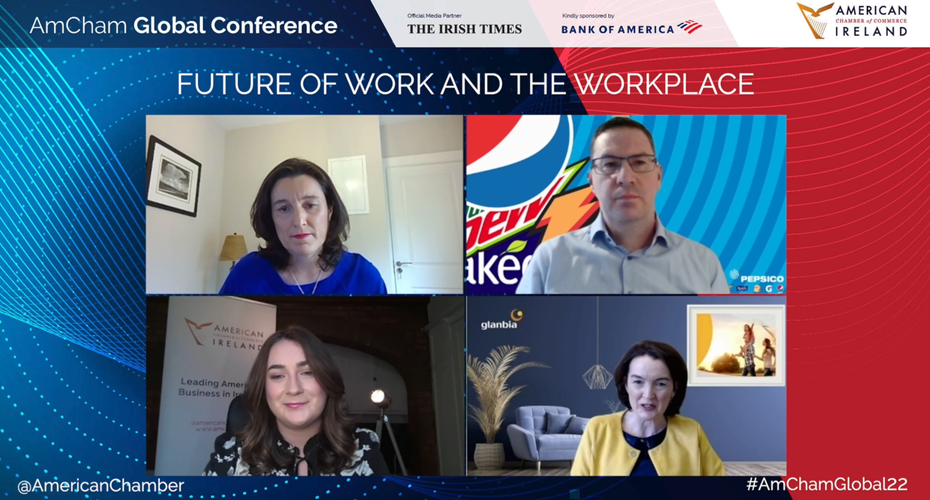Future of Work: Increased Talent Pool and Better Work-life Balance

The Covid-19 pandemic and flexible working have “potentially broadened the talent pool” for businesses operating in Ireland, the HR director of a leading US multinational said.
Joanne Morrissey, HR Director for Microsoft Ireland said that the daily in-person attendance required in most offices prior to the pandemic, does not accommodate a suitable work-life balance for a lot of people.
Speaking at the AmCham Global Business Conference on the Future of Work Panel, Morrissey said that the increase in remote working brought about by the pandemic, means that people with childcare responsibilities, or with a disability, who may not be in a position to attend the office, will now be able to apply for a greater number of roles.
Morrisey added that people can now “configure their office space the way they need it,” creating greater flexibility for employees.
Global Business Conference
The AmCham Global Business Conference, was held on Thursday March 24, featuring contributions from Eurogroup President and Irish Finance Minister, Paschal Donohoe, EU Commissioner, Mairead McGuinness, and global leaders from over 10 multinationals.
The conference, which was sponsored by Bank of America, addressed issues in the context of Global Trade and Investment including the opportunities for Ireland in Sustainability, the 21st Century Diversified Global Supply Chain, Data, Digital and Privacy and the Future of Work, Team Culture and Collaboration.
The Future of Work panel was hosted by Keelan Lombard, AmCham Leadership and Development Manager. Morrissey was joined on the panel by Michelle Abbey, HR Director for Corporate and Business Services and Global HR Transformation Director at Glanbia, Brian Cassidy, HR Director.
‘Smart Working’
The panel also discussed the concept of “smart working” which Michelle Abbey said is something that is new and under continued development, by her team. Abbey said that “smart working” aims to focus upon the societal shift towards increased remote and hybrid working.
She said that in order for “smart working” to be a success we need to strive to understand the situations where an office would be beneficial, as well as recognising where we should “facilitate and enable a continued working from home.”
Abbey reiterated that everyone – employees and businesses alike – are still coming to terms with the new modes of working that have arisen from two years of public health restrictions. This means that even where an employer has committed to “smart” approaches to working arrangements, everyone is still very much in the learning phase.
“It’s not easy to try and get that balance right...and to really understand what works for our employees and also for our business as well,” Abbey said.
Challenges to Remote and Hybrid Working
Brian Cassidy noted that while there are many positives to increase remote and hybrid working, there are also a number of hazardous elements.
While providing greater flexibility around working arrangements is an improvement in the lives of many, Cassidy said that “different people have different views on what flexibility means.”
He also expressed concern surrounding the implications of an employee who decides to move abroad without telling their company and continuing to work remotely.
However, Cassidy said he recognises that there will not be a return to the pre-pandemic working environment. “There’s no going back to the old office environment, that’s for sure.”
Future Focused
After forty minutes of insightful conversation, our panel largely came to the agreement that the dawn of flexible working is a huge step forward for a more balanced lifestyle, both in the office and outside it.
Morrissey rounded up our panel discussion on the Future of Work saying, “Really, it’s not about having a one size fits all approach, it’s more around challenging our own assumptions and working through a set of guiding principles that we all adhere to and that we test and then being clear on the expectations that we have of each other as individuals and of teams.”